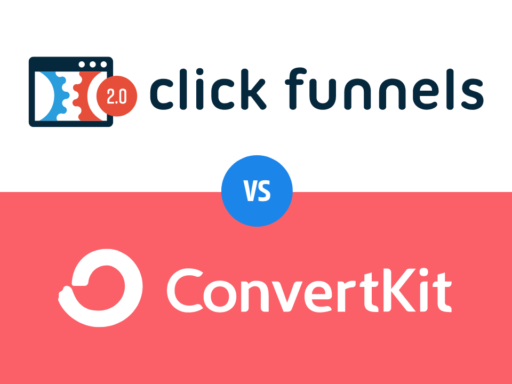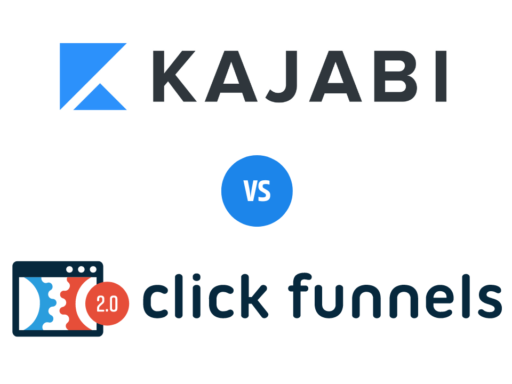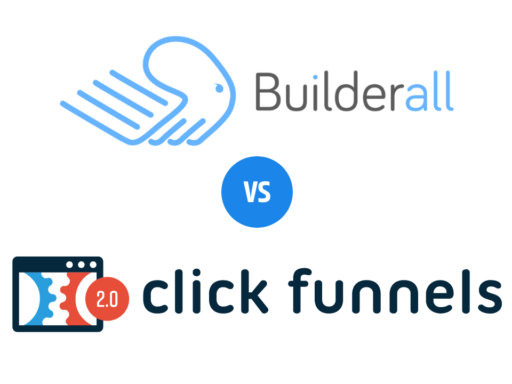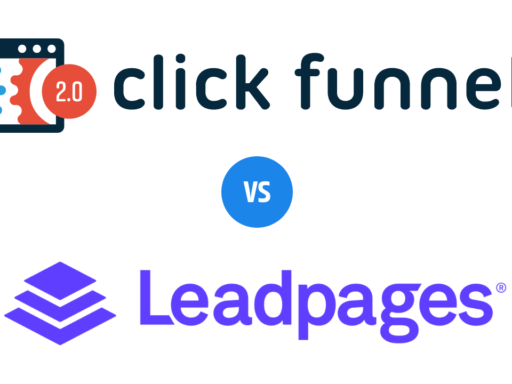
Table of Contents
ClickFunnels vs Shopify: At a Glance
ClickFunnels vs Shopify is a common debate among entrepreneurs and business owners looking to enhance their online presence and maximize their sales potential. Both platforms offer robust solutions tailored to different aspects of running an online business. ClickFunnels is renowned for its powerful sales funnel capabilities, designed to optimize conversions and streamline the customer journey. Shopify, on the other hand, is a leading e-commerce platform, celebrated for its comprehensive tools to manage and grow online stores.
In this article, we will compare ClickFunnels and Shopify across several critical criteria: E-commerce Features, Sales Funnel Features, Website and Landing Page Builder, Marketing Tools, Analytics and Reporting, Integrations, Pricing, Ease of Use, and Scalability. By examining these aspects, you’ll gain a clearer understanding of which platform best aligns with your business goals and strategies. Whether you are focusing on creating high-converting sales funnels or building a full-fledged online store, this comparison will help you make an informed decision in the ClickFunnels vs Shopify debate.
E-commerce Features
ClickFunnels
ClickFunnels primarily focuses on creating and optimizing sales funnels rather than providing a comprehensive e-commerce solution. However, it does offer essential e-commerce features that allow users to sell products and services directly through their funnels. This includes support for payment gateways like Stripe and PayPal, one-click upsells, downsells, and order bumps to maximize sales. While ClickFunnels is effective for driving sales through its funnels, it lacks advanced e-commerce functionalities such as inventory management, complex product listings, and detailed customer profiles, which might be necessary for larger or more complex online stores.
Shopify
Shopify excels as a dedicated e-commerce platform, offering a comprehensive suite of features tailored to running an online store. It supports extensive product management, including inventory tracking, variant management, and detailed product descriptions. Shopify integrates with numerous payment gateways, provides robust order management, and offers tools for shipping and fulfillment. Additionally, Shopify includes advanced features like abandoned cart recovery, customer profiles, and multi-channel selling. Its app store allows for further customization and enhancement of store functionalities, making it a robust solution for businesses of all sizes looking to manage and scale their online presence.
Website and Landing Page Builder
ClickFunnels
ClickFunnels provides a user-friendly drag-and-drop editor designed to create high-converting landing pages and complete sales funnels. Its templates are optimized for conversion and are highly customizable, allowing users to tailor them to their specific needs. The platform focuses on guiding visitors through a predefined sales path, which is ideal for generating leads and driving sales. However, as a dedicated sales funnel builder, it may not offer the same level of flexibility and design variety as a full-fledged website builder like Shopify. The templates are designed primarily for conversion, which might limit creative freedom.
Shopify
Shopify offers a robust website and landing page builder that caters to the needs of e-commerce businesses. It provides a wide selection of professional templates that are fully customizable through a user-friendly drag-and-drop editor. Shopify’s themes are designed to be visually appealing and functional, allowing businesses to create attractive, fully functional online stores. The platform also supports blogging and content creation, enabling users to build a comprehensive online presence. While Shopify excels in creating aesthetically pleasing and fully integrated e-commerce websites, it may not be as specialized in building high-converting sales funnels compared to ClickFunnels.
Sales Funnel Features
ClickFunnels
ClickFunnels is renowned for its powerful sales funnel features, making it easy for users to build, manage, and optimize complex sales funnels. The platform offers a variety of pre-built funnel templates tailored to different business goals, such as lead generation, product launches, and membership sites. ClickFunnels includes features like one-click upsells, downsells, and order bumps to enhance the customer journey and maximize revenue. Additionally, its built-in analytics and A/B testing tools allow users to refine their funnels for optimal performance. ClickFunnels’ primary strength lies in its ability to create highly effective sales funnels that drive conversions and sales.
Shopify
While Shopify is primarily an e-commerce platform, it does offer some basic sales funnel features through its app integrations. Users can create simple funnels using apps for upsells, cross-sells, and abandoned cart recovery. However, Shopify’s core functionality is centered around building and managing online stores, and it does not offer the same depth of sales funnel features as ClickFunnels. For businesses looking to implement advanced sales funnels, Shopify may require additional third-party apps and integrations, which can add complexity and cost. Shopify’s strength lies in its comprehensive e-commerce capabilities rather than specialized sales funnel features.
Marketing Tools
ClickFunnels
ClickFunnels offers a range of marketing tools designed to help businesses optimize their sales funnels and drive conversions. These include email marketing integration with Actionetics, which allows users to create targeted email campaigns and automated follow-up sequences. ClickFunnels also provides tools for creating webinars, membership sites, and affiliate programs. The platform’s focus on marketing automation and funnel optimization makes it a powerful tool for businesses looking to enhance their marketing efforts and increase sales through highly targeted campaigns.
Shopify
Shopify offers robust marketing tools tailored to e-commerce businesses. These include built-in SEO features, social media integration, and the ability to run email marketing campaigns through Shopify Email or third-party integrations. Shopify also supports various advertising platforms, allowing users to create and manage ads on Google, Facebook, and Instagram directly from the Shopify dashboard. Additionally, Shopify’s app store offers numerous marketing apps that extend its capabilities, including tools for retargeting, discount codes, and customer loyalty programs. Shopify’s comprehensive marketing toolkit helps businesses attract and retain customers through multiple channels.
Analytics and Reporting
ClickFunnels
ClickFunnels provides detailed analytics and reporting tools to help users track the performance of their sales funnels. These tools include metrics such as conversion rates, click-through rates, and sales data. Users can view detailed reports on each step of their funnels, allowing them to identify bottlenecks and optimize for better performance. ClickFunnels also offers A/B testing features, enabling users to experiment with different funnel variations and determine the most effective strategies. While ClickFunnels excels in funnel-specific analytics, its reporting capabilities may not cover broader e-commerce metrics in as much detail as Shopify.
Shopify
Shopify offers comprehensive analytics and reporting features tailored to e-commerce businesses. Users can access detailed reports on sales, customer behavior, and product performance. Shopify’s dashboard provides an overview of key metrics, such as total sales, conversion rates, and average order value. The platform also integrates with Google Analytics, allowing users to gain deeper insights into their website traffic and customer interactions. Additionally, Shopify’s advanced reporting tools are available on higher-tier plans, providing custom reports and in-depth analysis to help businesses make data-driven decisions. Shopify’s robust analytics suite covers a wide range of e-commerce metrics, making it an essential tool for online retailers.
Integrations
ClickFunnels
ClickFunnels supports a wide range of integrations with third-party tools, enhancing its functionality and flexibility. Users can connect ClickFunnels with popular email marketing services, payment gateways, CRM systems, and webinar platforms. The platform also offers Zapier integration, which allows users to automate workflows and connect with thousands of additional apps. This extensive integration capability ensures that users can build a cohesive marketing stack tailored to their specific needs. However, some integrations may require additional setup and can occasionally be less seamless than desired.
Shopify
Shopify excels in its ability to integrate with numerous marketing tools and services, providing users with flexibility in building their marketing ecosystem. The platform connects easily with major email marketing services, CRM systems, payment gateways, and analytics tools. Shopify also supports Zapier integration, enabling users to connect with a wide array of apps and automate various tasks. Additionally, Shopify’s extensive app store offers thousands of apps designed to enhance its functionality, from inventory management to customer service. This extensive integration capability allows users to leverage the best tools for their marketing strategies and overall business operations.
Scalability and Performance
ClickFunnels
ClickFunnels is designed to handle growing businesses and can scale with increased traffic and sales volume. Its robust infrastructure ensures that funnels operate smoothly, even with high volumes of traffic. The platform is built to support complex sales funnels, making it suitable for businesses that anticipate rapid growth and need a reliable system to manage their marketing efforts. However, as your business scales, the need for higher-tier plans becomes more apparent to access advanced features and support.
Shopify
Shopify excels in scalability and performance, making it an ideal choice for businesses of all sizes. The platform is built to handle high traffic volumes and large inventories, ensuring that your online store runs smoothly even during peak times. Shopify Plus, the enterprise version of Shopify, offers additional features and support for high-growth businesses, including dedicated account management and advanced customization options. Shopify’s infrastructure is optimized for e-commerce, providing fast load times and reliable performance, which is crucial for maintaining customer satisfaction and conversion rates.
Ease of Use
ClickFunnels
ClickFunnels is known for its user-friendly interface and intuitive design. The drag-and-drop editor makes it easy for users to create and customize sales funnels without needing technical skills. The platform provides a range of templates and step-by-step guides to help users get started quickly. However, some advanced features and integrations may require a bit of a learning curve, especially for users new to digital marketing.
Shopify
Shopify is also highly regarded for its ease of use. The platform features a clean, intuitive interface that makes it easy for users to set up and manage their online stores. The drag-and-drop editor and a vast library of themes allow for quick customization. Shopify also provides extensive documentation, tutorials, and 24/7 customer support to assist users at every stage. The straightforward setup process and user-friendly design make Shopify accessible to users of all technical skill levels, from beginners to experienced e-commerce professionals.
Pricing
ClickFunnels
ClickFunnels offers three main pricing tiers: the Basic plan at $97 per month, the Platinum plan at $297 per month, and a higher-tier plan with custom pricing for enterprise-level features. The Basic plan includes essential funnel-building features, while the Platinum plan provides access to advanced tools like Actionetics for email marketing and Backpack for affiliate management. While ClickFunnels offers powerful features, its pricing is relatively high, which can be a barrier for smaller businesses or individuals on a tight budget. The cost increases significantly if users need access to advanced features locked behind higher-tier plans.
Shopify
Shopify provides three primary pricing plans: Basic Shopify at $29 per month, Shopify at $79 per month, and Advanced Shopify at $299 per month. Each plan includes essential e-commerce features, with higher-tier plans offering more advanced capabilities like professional reports and third-party calculated shipping rates. Shopify also offers a Lite plan at $9 per month for selling on social media and a Plus plan for enterprise businesses with custom pricing. The pricing structure is more flexible and affordable for small to medium-sized businesses compared to ClickFunnels, making it accessible to a broader range of users. However, additional costs can accrue from apps and transaction fees, depending on the payment gateway used.
Conclusion – ClickFunnels vs Shopify
In the ClickFunnels vs Shopify comparison, it’s clear that both platforms offer unique strengths tailored to different business needs. ClickFunnels excels in creating and optimizing sales funnels with its powerful marketing tools and robust sales funnel features. It is an excellent choice for businesses focused on maximizing conversions and building comprehensive marketing campaigns. However, its higher pricing and learning curve for advanced features might be a consideration for smaller businesses.
On the other hand, Shopify shines as a dedicated e-commerce platform, providing extensive e-commerce features, a user-friendly website builder, and seamless integrations with various marketing and sales tools. Its scalability and performance make it ideal for businesses of all sizes, especially those looking to manage a comprehensive online store. Shopify’s flexible pricing plans and ease of use further enhance its appeal to a wide range of users, from small startups to large enterprises.
Ultimately, the decision between ClickFunnels vs Shopify depends on your specific business goals and needs. If your primary focus is on creating high-converting sales funnels and leveraging advanced marketing tools, ClickFunnels may be the better option. Conversely, if you need a robust, scalable solution for managing and growing an online store, Shopify is likely the superior choice. By carefully considering the features and capabilities of each platform, you can make an informed decision that best supports your business objectives.
Check out other similar articles below:
- ClickFunnels vs Shopify – Top Comparison (2024)
- ClickFunnels vs Leadpages: Unveiling the Ultimate Landing Page Champion [2024]
- Builderall vs ClickFunnels: Pros, Cons, and Key Differences Explained [2024]
- Kajabi vs ClickFunnels: Which Platform Boosts Your Business Best? [2024]
- Clickfunnels vs Convertkit: A Comprehensive Comparison (2024)




